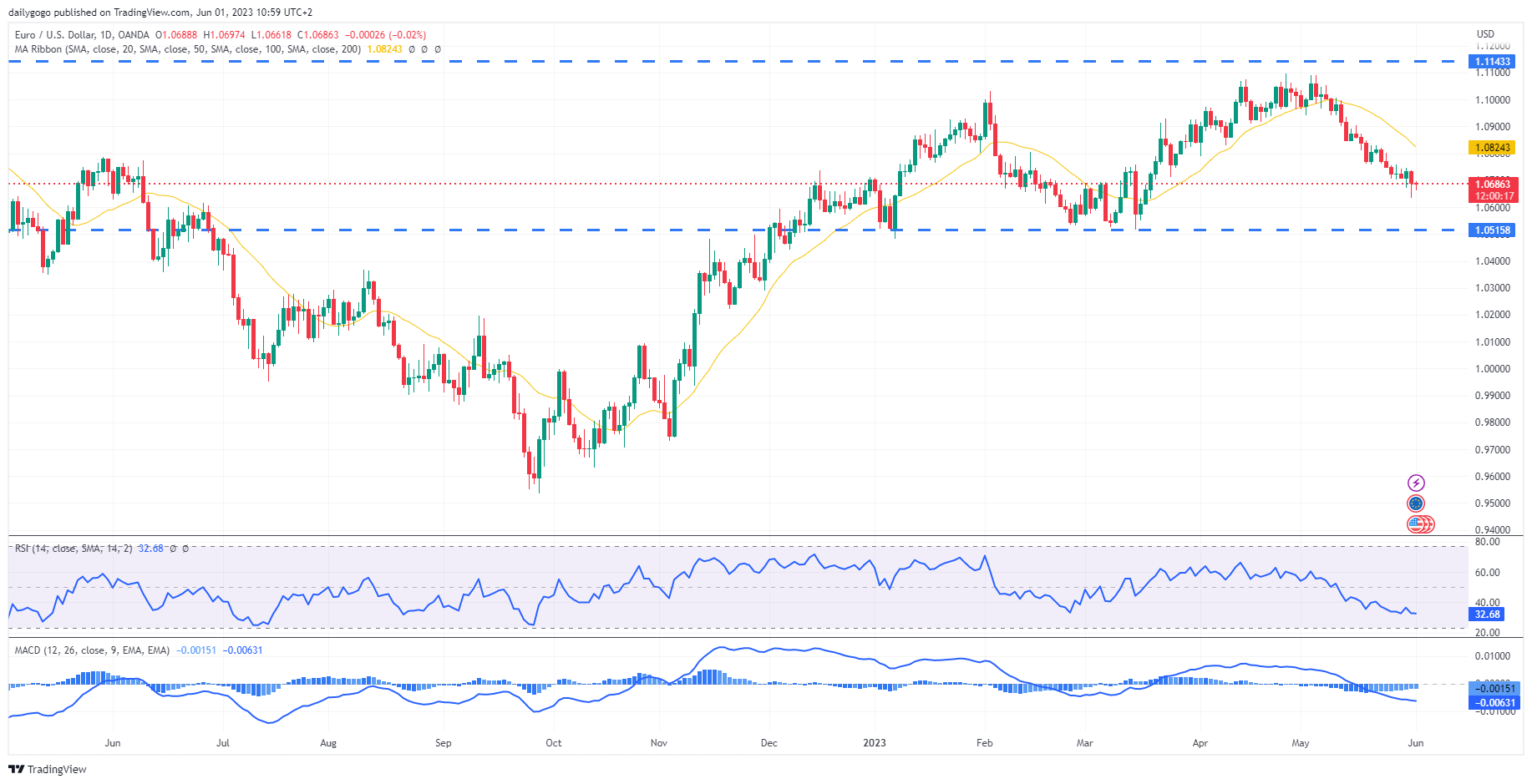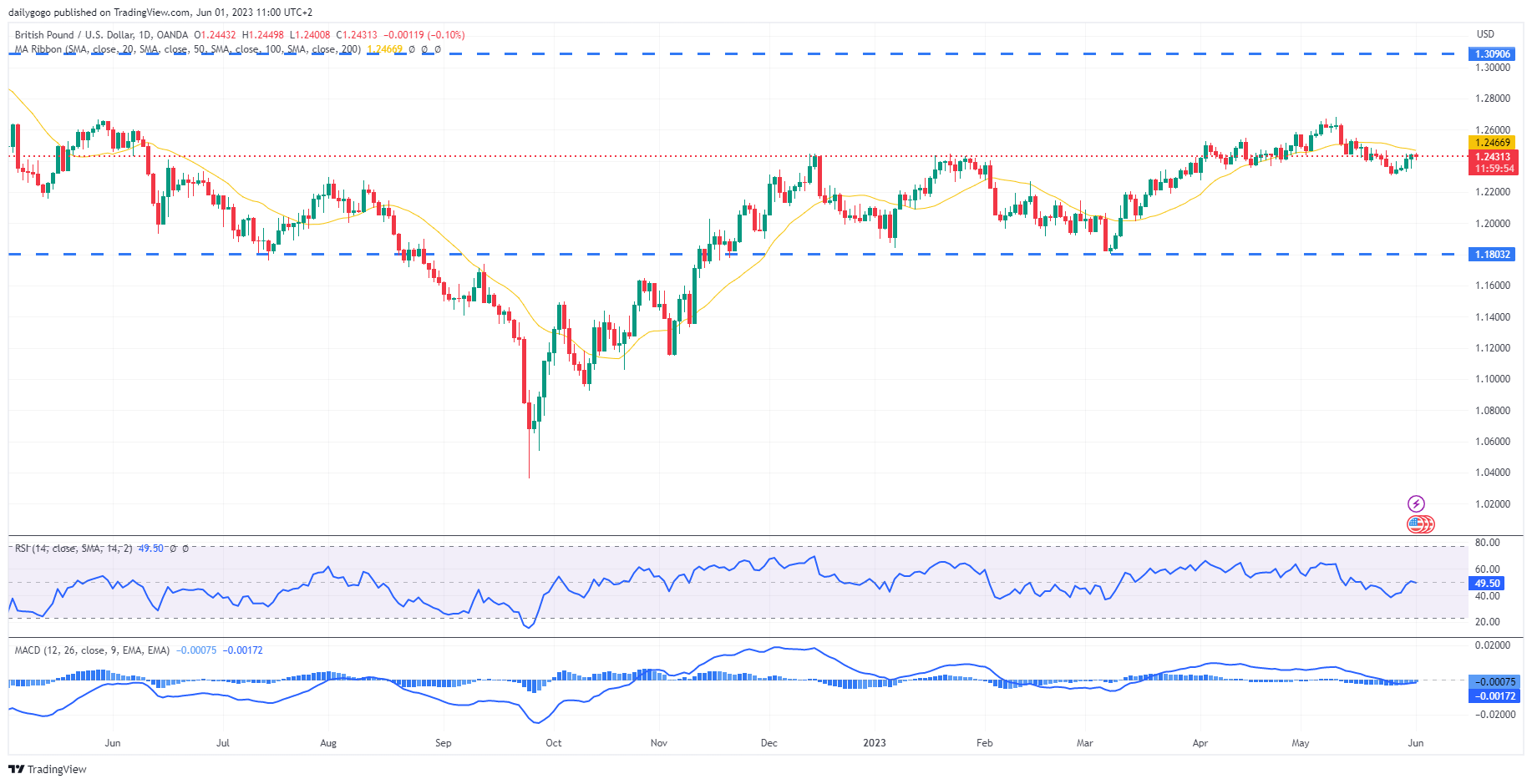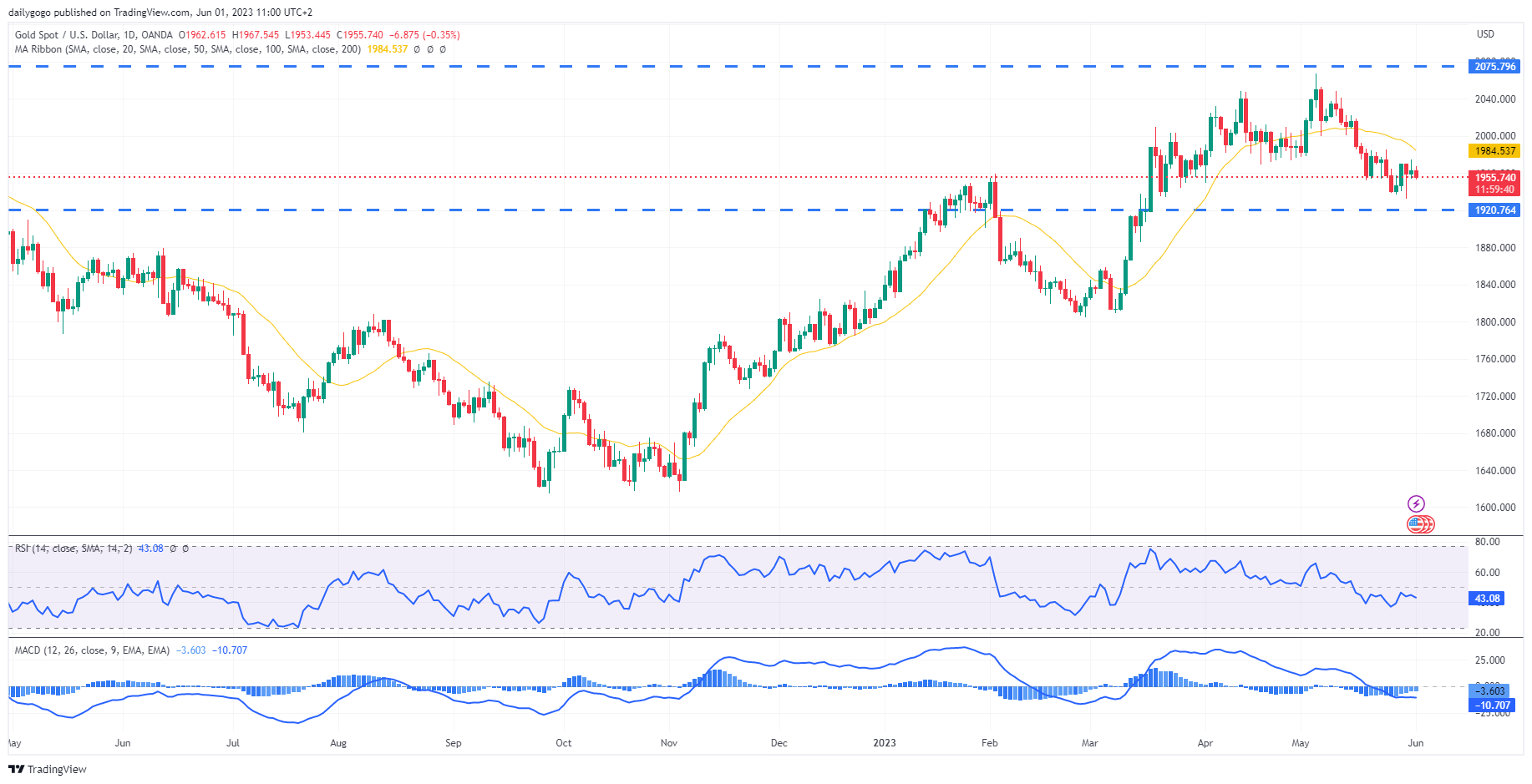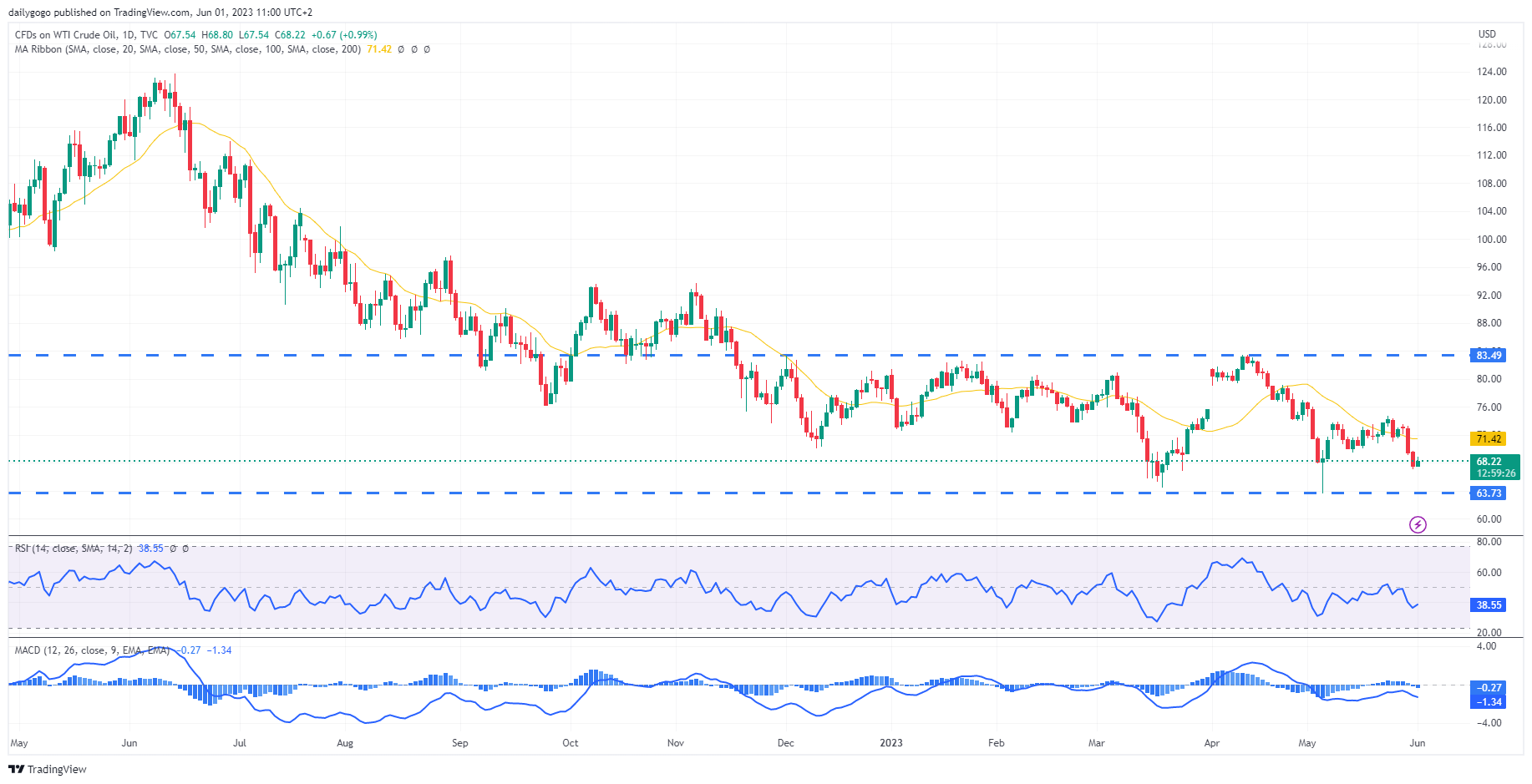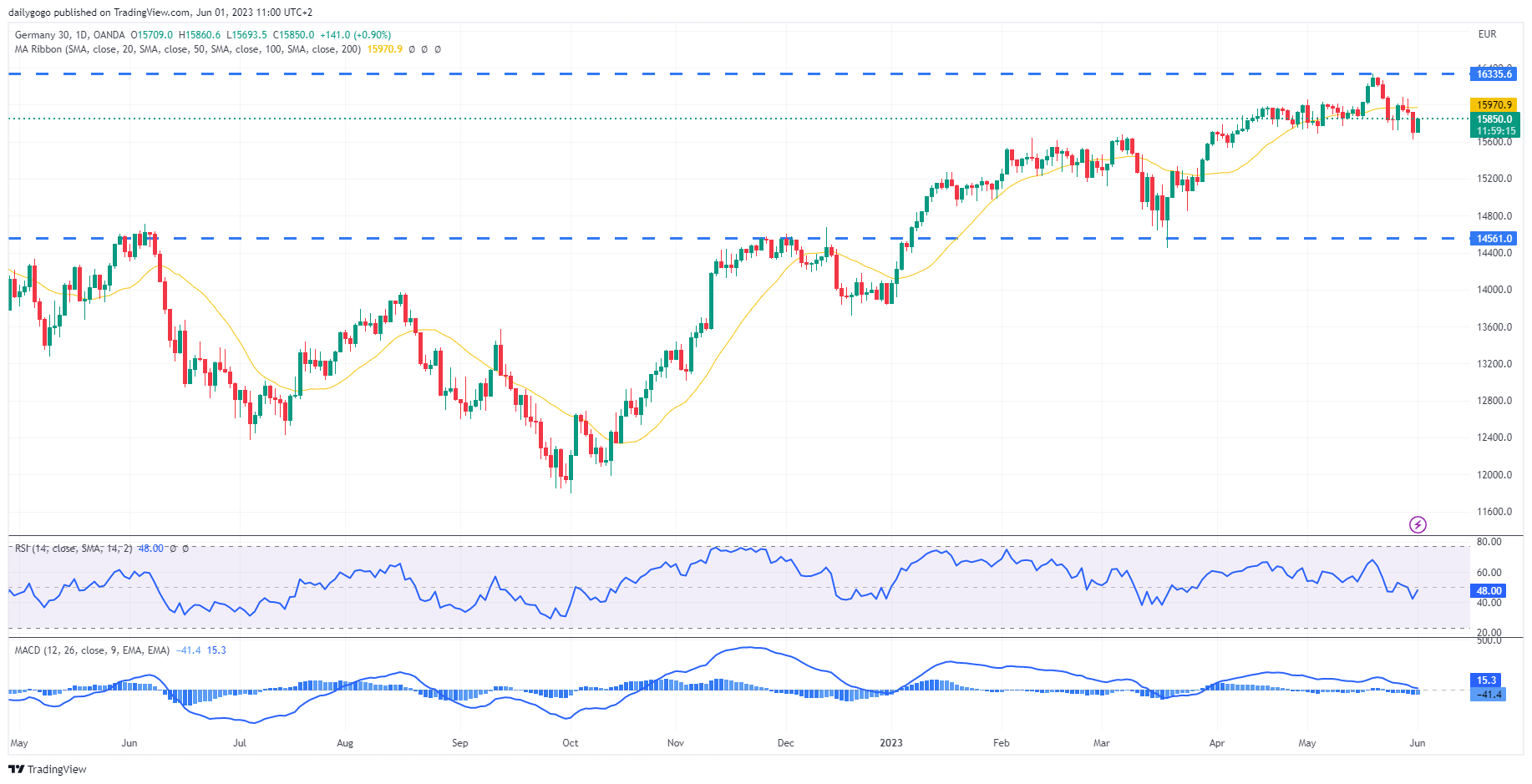EURUSD
- EUR/USD declined by 0.1% to 1.0680 following the release of German retail sales data, showing a 0.8% growth in April but still reflecting a 4.3% annual decrease.
- Market focus shifted to the upcoming May eurozone inflation release, which is expected to be a key factor influencing the euro-dollar exchange rate.
- ECB Vice-President Luis de Guindos stated that the central bank has implemented most of its monetary policy tightening measures to bring inflation back to its medium-term target of 2%. However, he noted that the tightening cycle is not yet complete.
- The U.S. dollar stabilized in early European trading, maintaining its position near a two-month high. Traders were digesting progress in the U.S. debt ceiling bill, comments from several Federal Reserve speakers, and recent Chinese manufacturing activity data.
- EUR/USD experienced a slight decline as German retail sales showed improvement but still reflected a year-on-year decrease.
Closing statement: Market attention now turns to the release of eurozone inflation data, which could have an impact on the currency pair. The stability of the U.S. dollar near a two-month high indicates that traders are considering various factors such as the U.S. debt ceiling bill, comments from Fed officials, and economic data from China.
GBPUSD
- GBP/USD edged lower to 1.2418 following data from Nationwide building society, which indicated a 3.4% annual decrease in housing prices in May.
- Expectations of further rate hikes from the Bank of England (BoE) are increasing, with money markets pricing in around 100 basis points of hikes by November.
- The DXY, which tracks the dollar against six other currencies, traded largely flat at 104.450, slightly below the over two-month high reached in the previous session.
- Market attention now focuses on the monetary policy intentions of Federal Reserve officials as the next meeting approaches.
- GBP/USD experienced a decline in response to the fall in housing prices and the expectations of future rate hikes by the Bank of England.
| SMA (20) | Slightly Falling | ||
| RSI (14) | Neutral | ||
| MACD (12, 26, 9) | Neutral |
Closing statement: Traders will closely monitor the upcoming actions and statements of the Bank of England and Federal Reserve officials as these central banks play a significant role in shaping the future movements of GBP/USD.
GOLD
- Gold prices declined on Thursday, continuing a period of consolidation, as market expectations of the Federal Reserve maintaining interest rates in June gained traction.
- The safe-haven dollar retreated from recent highs following the U.S. House of Representatives' approval of a bill to suspend the debt ceiling late on Wednesday.
- The bill now awaits approval from the Senate, reducing the likelihood of a default in the world's largest economy.
- Philadelphia Federal Reserve President Patrick Harker's remarks on Wednesday, expressing a willingness to pause interest rate hikes in June to evaluate incoming data, provided significant support for the potential pause.
- Market attention is focused on the evolving dynamics surrounding interest rate decisions by the Federal Reserve, which could have implications for gold prices.
| SMA (20) | Slightly Falling | |||
| RSI (14) | Slighty Falling | |||
| MACD (12, 26, 9) | Slighty Falling |
Closing statement: Gold prices experienced a decline amid growing expectations of the Federal Reserve keeping interest rates unchanged in June. The progress in the U.S. debt ceiling bill and the possibility of a pause in rate hikes indicated by a Fed official contributed to the market sentiment surrounding gold. Traders will closely monitor upcoming developments related to monetary policy decisions by the Federal Reserve for further guidance on gold price movements.
CRUDE OIL
- Crude oil prices experienced an increase in Asian trade on Thursday, bouncing back from nearly one-month lows, driven by optimism surrounding progress in avoiding a U.S. debt default and positive signals from Chinese manufacturing, indicating a potential demand recovery.
- The positive sentiment in oil markets was supported by a private survey indicating stronger-than-expected growth in China's manufacturing sector in May, contrasting with an official survey that reported a contraction in manufacturing activity.
- According to the American Petroleum Institute, U.S. crude inventories increased by 5.202 million barrels in the week ending May 26.
- The Energy Information Administration (EIA) is anticipated to announce a drop of 1.1 million barrels in crude stockpiles in its report for today.
- Investors will closely monitor the EIA's report on crude stockpiles for further insights into the supply-demand dynamics in the oil market.
| SMA (20) | Slightly Falling | ||
| RSI (14) | Neutral | ||
| MACD (12, 26, 9) | Slightly Falling |
Closing statement: Crude oil prices rebounded from recent lows, buoyed by optimism surrounding progress in averting a U.S. debt default and positive data on Chinese manufacturing. While the U.S. crude inventory balance showed an increase, market attention is now focused on the upcoming report from the Energy Information Administration, which is expected to reveal a decrease in crude stockpiles.
DAX
- The DAX index in Germany recorded a 0.77% increase, while the CAC 40 in France and the FTSE 100 in the U.K. rose by 0.91% and 0.43%, respectively.
- Recent data from several EU countries suggest a decrease in inflationary pressures, which could potentially lead to a lower-than-expected annual figure of 7.0% for May.
- This aligns with the viewpoint of dovish members of the European Central Bank governing council, who advocate for an early end to interest rate hikes.
- Later in the session, manufacturing Purchasing Managers' Index (PMI) data for various European countries are expected to reveal ongoing challenges caused by high prices and disrupted supply chains in the sector.
- The PMI data will provide insights into the current state of the manufacturing industry in Europe.
| SMA (20) | Neutral |
| RSI (14) | Neutral |
| MACD (12, 26, 9) | Neutral |
Closing statement: European stock markets, including the DAX, CAC 40, and FTSE 100, demonstrated positive performance. The easing inflation pressures observed in individual EU countries may support calls from dovish ECB members to conclude interest rate increases earlier. However, challenges persist in the manufacturing sector, as indicated by the anticipated PMI data, reflecting the impact of soaring prices and disrupted supply lines.
